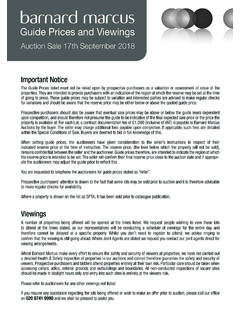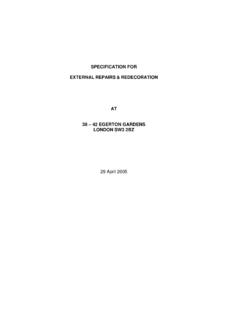Transcription of THE LANGUAGE INSTINCT - BU Blogs
1 #### 'E ACCLAIMED BESTSELLER BY THE AUTHOR OF A THE LANGUAGE INSTINCT ill (ITTY, LUCID AND ULTIMATELY ENTHRALLING' OBSERVER STEVEN PINKER o 'Presented with extraordinary lucidity, cogency and and gripping ..To have read [the book] is to have consulted a first draft of the structural plan of the human psyche .. a glittering tour deforce' Hugh Lawson-Tancred, Spectator In this brilliant and controversial book, Steven Pinker, one of the world's leading cognitive scientists, explains what the mind is, how it evolved, and how it allows us to see, think, feel, interact, enjoy the arts and ponder the mysteries of life. And he does it with the clarity and style that earned The LANGUAGE INSTINCT worldwide critical acclaim and several major prizes. Pinker has a knack tor making the profound seem obvious of evolutionary insights' Economist A fascinating bag A landmark in popular science Independent A major public asset' MarekKohn, A model of scientific writing: erudite, witty and clear.)
2 An excellent book' Steve Jones, New York Review of Books 'Marks out the territory on which the coming century's debate about human nature will be held' Oliver Morton, The New Yorker 'Pinker has a remarkable capacity to explain difficult ideas and he writes with the comic verve ol Martin Amis or Woody Allen .. Haw the mind Works will change the way your mind works' Elaine Showalter. The Times Cover illu*rracion by Haw nil Subbiah Author photograph: Bethany Versoy 0 PENGUIN Science AUST. S (recommended) ISBN 0J4491-3 78OU0M24<i915 90201 PENGUIN BOOKS how the mind works 'A witty, erudite, stimulating and provocative book that throws much new light on the machinery of the mind . An important book' Kenan Malik, Independent on Sunday 'He has a great deal to say, much of it ground-breaking, some of it highly a primer in remarkable science writing' Simon Garfield, Mail on Sunday 'As lengthy as it is, it will produce a book in the reader's head that is even longer.
3 For it alters completely the way one thinks about thinking, and its unforeseen consequences probably can't be contained by a book Christopher Lehmann-Haupt, The New York Times 'Witty popular science that you enjoy reading for the writing as well as for the science. No other science writer makes me laugh so much .. He is a top-rate writer, and deserves the superlatives that are lavished on him' Mark Ridley, The New York Times Book Review "The humour, breadth and clarity of make this work essential reading for anyone curious about the human mind ' Raymond Dolan, Observer ABOUT THE AUTHOR Steven Pinker, a native of Montreal, studied experimental psychology at McGill University and Harvard University. After serving on the fac-ulties of Harvard and Stanford universities he moved to the Mas-sachusetts Institute of Technology, where he is currently Professor of Psychology and Director of the Centre for Cognitive Neuroscience.
4 Pinker has studied many aspects of LANGUAGE and of visual cognition, with a focus on LANGUAGE acquisition in children. He is a fellow of sev-eral scientific societies, and has been awarded research prizes from the the National Academy of Sciences and the American Psychological Association, a teaching prize from MIT, and book prizes from the American Psychological Association, the Linguistics Society of Ameri-ca and the Los Angeles Times. His classic The LANGUAGE INSTINCT is also available in Penguin. how the mind works Steven Pinker PENGUIN BOOKS PENGUIN BOOKS Published by the Penguin Group Penguin Books Ltd, 27 Wrights Lane, London W8 5TZ, England Penguin Putnam Inc., 375 Hudson Street, New York, New York 10014, USA Penguin Books Australia Ltd, Ringwood, Victoria, Australia Penguin Books Canada Ltd, 10 Alcorn Avenue, Toronto, Ontario, Canada M4V 3B2 Penguin Books (NZ) Ltd, 182-190 Wairau Road, Auckland 10, New Zealand Penguin Books Ltd, Registered Offices: Harmondsworth, Middlesex, England First published in the USA by W.
5 W. Norton 1997 First published in Great Britain by Allen Lane The Penguin Press 1998 Published in Penguin Books 1998 13579 10 8642 Copyright Stephen Pinker, 1997 All rights reserved The notices on page 627 constitute an extension of this copyright page The moral right of the author has been asserted Printed in England by Clays Ltd, St Ives pic Except in the United States of America, this book is sold subject to the condition that it shall not, by way of trade or otherwise, be lent, re-sold, hired out, or otherwise circulated without the publisher's prior consent in any form of binding or cover other than that in which it is published and without a similar condition including this condition being imposed on the subsequent purchaser FOR ILAVENIL CONTENTS Preface ix J Standard Equipment 3 2 Thinking Machines 59 3 Revenge of the Nerds 149 4 The mind 's Eye 211 5 Good Ideas 299 6 Hotheads 363 7 Family Values 425 8 The Meaning of Life 521 Notes 567 References 589 Index 629 Vll _d PREFACE Any book called how the mind works had better begin on a note of humility, and I will begin with two.
6 First, we don't understand how the mind works not nearly as well as we understand how the body works, and certainly not well enough to design Utopia or to cure unhappiness. Then why the auda-cious title? The linguist Noam Chomsky once suggested that our igno-rance can be divided into problems and mysteries. When we face a problem, we may not know its solution, but we have insight, increasing knowledge, and an inkling of what we are looking for. When we face a mystery, however, we can only stare in wonder and bewilderment, not knowing what an explanation would even look like. I wrote this book because dozens of mysteries of the mind , from mental images to roman-tic love, have recently been upgraded to problems (though there are still some mysteries, too!). Every idea in the book may turn out to be wrong, but that would be progress, because our old ideas were too vapid to be wrong.
7 Second, J have not discovered what we do know about how the mind works . Few of the ideas in the pages to follow are mine. I have selected, from many disciplines, theories that strike me as offering a special insight into our thoughts and feelings, that fit the facts and predict new ones, and that are consistent in their content and in their style of expla-nation. My goal was to weave the ideas into a cohesive picture using two even bigger ideas that are not mine: the computational theory of mind and the theory of the natural selection of replicators. ix x I how the mind works The opening chapter presents the big picture: that the mind is a sys-tem of organs of computation designed by natural selection to solve the problems faced by our evolutionary ancestors in their foraging way of life. Each of the two big ideas computation and evolution then gets a chapter.
8 I dissect the major faculties of the mind in chapters on percep-tion, reasoning, emotion, and social relations (family, loverS, rivals, friends, acquaintances, allies, enemies). A final chapter discusses our higher callings: art, music, literature, humor, religion, and philosophy. There is no chapter on LANGUAGE ; my previous book The LANGUAGE INSTINCT covers the topic in a complementary way. This book is intended for anyone who is curious about how the mind works . I didn't write it only for professors and students, but I also didn't write it only to "popularize science." I am hoping that scholars and general readers both might profit from a bird's-eye view of the mind and how it enters into human affairs. At this high altitude there is little difference between a specialist and a thoughtful layperson because nowadays we spe-cialists cannot be more than laypeople in most of our own disciplines, let alone neighboring ones.
9 I have not given comprehensive literature reviews or an airing of all sides to every debate, because they would have made the book unreadable, indeed, unliftable. My conclusions come from assess-ments-of the convergence of evidence from different fields and methods, and I have provided detailed citations so readers can follow them Up. I have intellectual debts to many teachers, students, and colleagues, but most of all to John Tooby and Leda Cosmides. They forged the syn-thesis between evolution and psychology that made this book possible, and thought up many of the theories I present (and many of the better jokes). By inviting me to spend a year as a Fellow of the Center for Evo-lutionary Psychology at the University of California, Santa Barbara, they provided an ideal environment for thinking and writing and immeasur-able friendship and advice.
10 I am deeply grateful to Michael Gazzaniga, Marc Hauser, David Kem-merer, Gary Marcus, John Tooby, and Margo Wilson for their relading of the entire manuscript and their invaluable criticism and encouragement. Other colleagues generously commented on chapters in their areas of expertise: Edward Adelson, Barton Anderson, Simon Baron-Cohien, Ned Block, Paul Bloom, David Brainard, David Buss, John Constable, Leda Cosmides, Helena Cronin, Dan Dennett, David Epstein, Alan Fridlund, Gerd Gigerenzer, Judith Harris, Richard Held, Ray Jackendoff, Alex Kacelnik, Stephen Kosslyn, Jack Loomis, Charles Oman, Bernard Sher-Preface xi man, Paul Smolensky, Elizabeth Spelke, Frank Sulloway, Donald Symons, and Michael Tarr. Many others answered queries and offered profitable suggestions, including Robert Boyd, Donald Brown, Napoleon Chagnon, Martin Daly, Richard Dawkins, Robert Hadley, James Hillen-brand, Don Hoffman, Kelly Olguin Jaakola, Timothy Ketelaar, Robert Kurzban, Dan Montello, Alex Pentland, Roslyn Pinker, Robert Provine, Whitman Richards, Daniel Schacter, Devendra Singh, Pawan Sinha, Christopher Tyler, Jeremy Wolfe, and Robert Wright.








